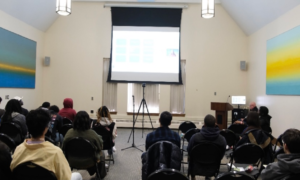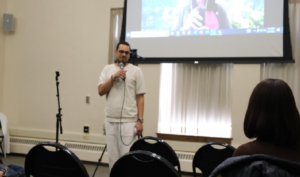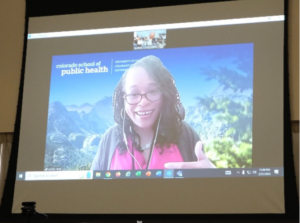Content Warning: This article contains discussion of violence and sexual assault.

On Tuesday, February 21, the Office of Multicultural Affairs (OMA), the Athletes of Color Coalition (ACC), and the Men of Color Alliance (MOCA) all came together in the Rittenburg Lounge and spent an hour reflecting on mental health and self love in the Black community. BHM leader Sydney Cross-Watts ’24 invited Dr. Cerise Hunt to speak on the subject, and lunch was graciously provided.

At every seat, there were slips of paper with the definition of self love and some suggested self-care activities, along with take-home goody bags. BHM leader Deion Kelly ‘23 kicked off the event with a few words and introduced Trinity Alumnus Mickey Correa ’20, who led us through a guided meditation with breathing exercises – featuring Karate Kid inspired ‘Miyagi Breaths’, and ‘Painting the Fence’, as well as his very own ‘Mickey Breaths’. We created Chi, a type of vital energy prominent in Chinese culture, by rubbing our hands together and then putting them over our heart while focusing on our breathing.
With everyone in a focused state, the spotlight shifted to Dr. Cerise Hunt. Dr. Hunt, PhD, MSW, is the Associate Dean for Equity, Diversity, and Inclusion, Director for the Center for Public Health Practice, and Assistant Professor in the Department of Community & Behavioral Health at the Colorado School of Public Health on the University of Colorado Anschutz Medical Campus.
Dr. Hunt captured the attention of everyone in the room by starting out with some striking statistics: 13.4% of the US population identifies as Black or African American, and of those, over 16% reported having a mental illness in the past year. That’s over 7 million people – more than the populations of Chicago, Houston, and Philadelphia combined. And those 7 million are only the people who reported their struggles. Numbers like these are reasons why these conversations are so important.
We watched a short, yet moving TedxTalk from Davonte Sanders-Funches out of North Central College about mental health within the Black community. Sanders-Funches starts off with personal anecdotes about his father being beaten and his mother being raped by a landlord, to moments in history (literacy tests, the war on drugs, police brutality) that illustrate how Black skin has always been under attack. He holds that the Black community’s very existence depends on strength, even when their humanity is being undermined, but conversely argues that being strong all the time has taken away the Black community’s ability to talk about their weaknesses. The lack of mental health resources is due to the stigmatization of mental illness to protect triumphant Black strength. But strength doesn’t mean silence, and Sanders-Funchers urges his brothers and sisters to reach out for help when they feel they need it.
Dr. Hunt contends that the impact of stress and not prioritizing mental health is killing the Black and African American community. She highlights something called ‘racial battle fatigue’. In essence, stress associated with racial microaggressions causes the Black and African American community to experience various forms of mental, emotional, and physical strain. Symptoms of racial battle fatigue range from anxiety and depression to hypertension and sleep issues. Being aware of the reality of racial battle fatigue and the cumulative effects of unavoidable, systemic racism are the first steps in improving health and wellness. Dr. Hunt preaches setting boundaries to ground oneself and thrive in the midst of all the chaos, and also offers a roadmap to coping with racial trauma.

This roadmap begins with assessing your ‘cup’. If your cup is not full, you cannot ‘pour’. It moves along to making lists of situations, people, or places that trigger symptoms of trauma, and of coping strategies for each of those circumstances. The map shows a path towards resistance, where many people find empowerment to speak up, or engage in community service or activism. It then ends introspectively with being able to recognize when you are not able to perform optimally and resting if you are able. Putting yourself first is a huge part of self love and care.
Dr. Hunt reminds us to be mindful of the people in our circles of influence, and that our self love can be enriched by surrounding ourselves with people who have genuine love for us, desire the best for us, and let us know the truth in a kind and loving manner. Seeking out supportive people is a controllable variable.
Self love looks different for everyone, but at its core it is taking care of yourself. For Dr. Hunt, doing equity and justice work all the time gets to be a bit draining. She ensures that she’s practicing self love, taking ‘pause’ moments, and doing things that she enjoys. After a little coaxing, she admitted that she loves the reality TV show ‘The Real Housewives’, and will binge watch it sometimes to reset mentally as part of her self care routine. Some attendees shared some self care/love actions they practice, including cooking, watching anime, meditating, working out, and accepting and owning up to mistakes.
According to the American Psychology Association, self love is having regard for your own well being and contentment. Dr. Hunt expanded – accepting yourself fully, treating yourself with kindness and respect, and nurturing your growth and well being are all part of self love. Self love is forgiving yourself when you mess up, meeting your own needs, and being assertive. In Dr. Hunt’s words, “A closed mouth don’t get fed!” Dr. Hunt contrasted the dynamic of not letting others take advantage of you or abuse you, while also letting go of grudges or anger that hold us back. She refers to engaging with these grudges as a ‘poison’ that we don’t want to fill our bodies with – instead, we should recognize our strengths, value our feelings, pursue our interests and goals, and hold ourselves accountable.
Dr. Hunt closed by pointing out Ms. Haben Abraham, one of the counselors in the Counseling and Wellness Center, who was in attendance (and also stayed after the meeting to field any questions students may have had).
Sydney Cross-Watts ’24 and Deion Kelly ’23, Black History Month Co-Leads for 2023, reflected on the event: “[The] Affirming Black Mental Health and Self Love Discussion was a very necessary event for Black History month …It fell at a perfect time of the month which allowed many students to meditate and reflect on mental health. The event also revealed how students may be racially fatigued and ways to cope with these feelings to move forward.”
Mickey Correa ’20 led us through a short closing meditation, and I walked out of the Rittenburg lounge with a meek humility and new perspective on the everyday struggles Black and African American communities face. I urge students and faculty alike to go to any one of the remaining events being put on for BHM – learning doesn’t just happen inside the classroom.